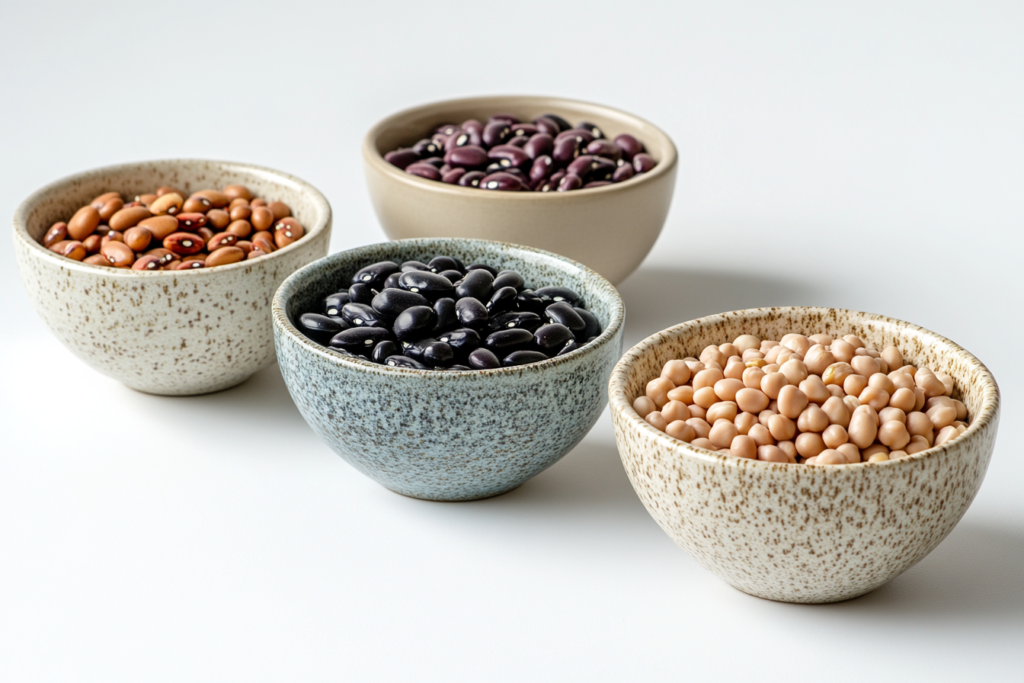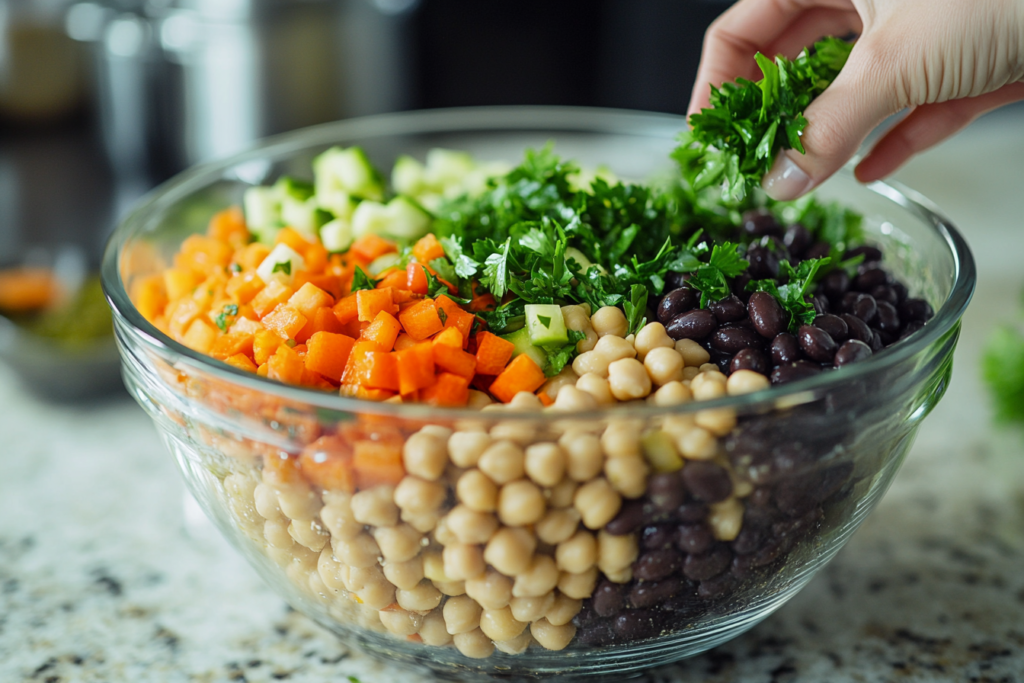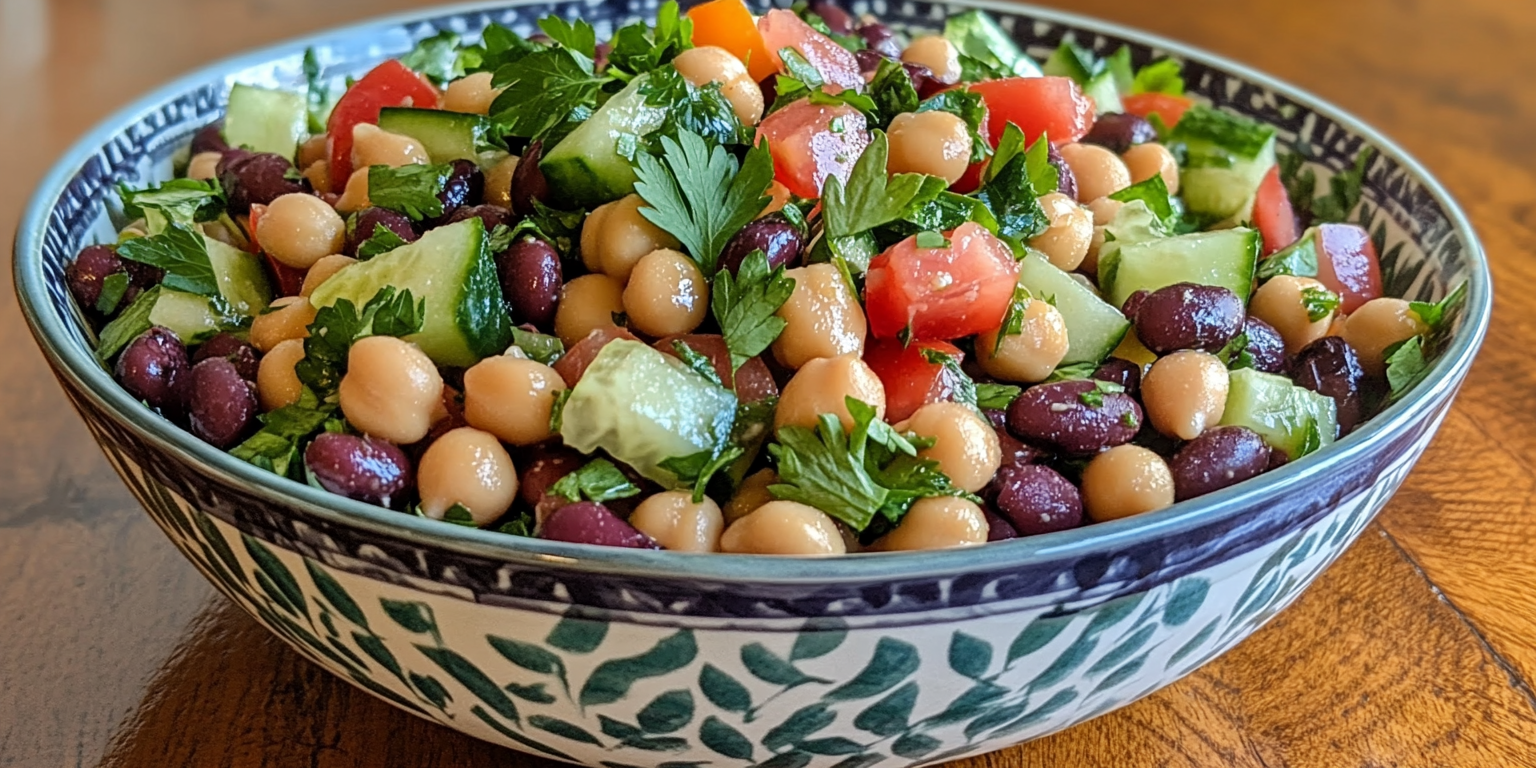Table of contents
Introduction to Dense Bean Salads
What are Dense Bean Salads?
Dense bean salads are hearty and nutrient-packed dishes that combine various types of beans with fresh vegetables, herbs, and flavorful dressings. These salads are celebrated for their rich texture, satisfying nature, and high protein content, making them an excellent choice for both main courses and side dishes.
Typically, dense bean salads feature a mix of beans such as chickpeas, black beans, kidney beans, or lentils, paired with ingredients like tomatoes, cucumbers, onions, and leafy greens. The addition of herbs like parsley or cilantro, along with olive oil, vinegar, or lemon-based dressings, enhances their flavor profile.
Not only are they versatile and easy to prepare, but dense bean salads also cater to various dietary preferences, being naturally gluten-free, vegetarian, and vegan-friendly. They are perfect for meal prepping, as they store well and develop deeper flavors over time.
Nutritional Profile of Beans
Key Nutrients in Beans
Beans are nutritional powerhouses, offering a wide range of essential nutrients that contribute to a healthy diet:
- Protein: Beans are an excellent plant-based protein source, making them ideal for vegetarians and vegans. A single cup of cooked beans can provide approximately 15 grams of protein, supporting muscle growth and repair.
- Fiber: Beans are rich in dietary fiber, which aids digestion, promotes satiety, and helps regulate blood sugar levels. A cup of beans often contains around 15 grams of fiber, meeting a significant portion of daily requirements.
- Vitamins: Beans are a good source of B vitamins, including folate, which is essential for cell growth and development. Folate is particularly important for pregnant individuals as it supports fetal health.
- Minerals: Beans provide a variety of important minerals such as iron, magnesium, potassium, and zinc. These minerals support energy production, bone health, and immune function.
Comparison with Other Protein Sources
When compared to other protein sources, beans stand out due to their unique nutritional profile:
- Beans vs. Animal Protein:
- Protein Content: Animal proteins like meat and eggs typically have higher protein density than beans. However, beans compensate with additional nutrients such as fiber, which is absent in animal proteins.
- Fat Content: Beans are low in saturated fat, unlike many animal proteins. This makes them a heart-healthier option.
- Cholesterol: Unlike animal products, beans are completely cholesterol-free.
- Beans vs. Soy-based Proteins (e.g., Tofu, Tempeh):
- Protein Content: Soy-based proteins often contain slightly more protein than beans. However, beans offer greater variety in terms of texture and flavor.
- Nutrients: Both beans and soy are rich in essential nutrients, but beans typically contain more fiber.
- Beans vs. Nuts and Seeds:
- Protein Content: While nuts and seeds provide protein, beans generally contain less fat and more carbohydrates, making them a more balanced option for sustained energy.
- Calories: Beans are lower in calories compared to many nuts and seeds, making them a lighter choice for protein intake.
Beans provide a sustainable, nutrient-dense, and affordable alternative to many traditional protein sources, making them a staple in diverse diets worldwide.
Health Benefits of Dense Bean Salads
High Protein Content and Muscle Maintenance
Dense bean salads are an excellent source of plant-based protein, essential for muscle maintenance, repair, and growth. The protein content in beans, such as black beans, kidney beans, and chickpeas, supports:
- Muscle Development: Protein provides the building blocks (amino acids) required for muscle tissue repair and growth, making bean salads a valuable addition to an active lifestyle.
- Sustained Energy: The slow-digesting nature of bean protein helps maintain energy levels over a prolonged period, ideal for physical activity or daily tasks.
- Weight Management: High protein content promotes satiety, helping to curb hunger and support weight control efforts.
Fiber-Rich Beans and Digestive Health
Beans are a powerhouse of dietary fiber, which plays a significant role in maintaining digestive health:
- Improved Digestion: The fiber in beans promotes regular bowel movements and prevents constipation by adding bulk to the stool.
- Gut Microbiome Support: Beans contain prebiotic fiber, which nourishes beneficial gut bacteria, fostering a balanced and healthy gut microbiome.
- Blood Sugar Regulation: The soluble fiber in beans helps slow the absorption of sugars, which can prevent blood sugar spikes and manage diabetes effectively.
Essential Vitamins and Minerals
Dense bean salads are a rich source of essential vitamins and minerals, contributing to overall health:
- Vitamins: Beans are particularly high in B vitamins, such as folate, which supports cell growth and brain function. This makes them an excellent choice for pregnant individuals and those looking to improve cognitive health.
- Minerals:
- Iron: Important for oxygen transport in the blood, preventing anemia and boosting energy levels.
- Magnesium: Vital for bone health, nerve function, and muscle contraction.
- Potassium: Helps regulate blood pressure and maintain heart health.
- Zinc: Supports immune function and aids in wound healing.
Role in Weight Management
Low-Calorie and Filling Nature of Dense Bean Salads
Dense bean salads are a weight-loss-friendly food choice due to their low-calorie yet filling composition:
- Low Calorie Density: Beans provide substantial nutrients and energy while remaining relatively low in calories. This allows for satisfying meals that support a calorie deficit when needed for weight loss.
- High Satiety: The combination of protein, fiber, and water content in dense bean salads helps you feel full longer, reducing the likelihood of overeating or snacking between meals.
- Portion Control: Dense bean salads are easy to portion, making them ideal for meal prepping or controlled dietary plans.
How Beans Regulate Appetite and Hunger
Beans play a critical role in appetite regulation, making them an effective component of a weight management strategy:
- Protein’s Role in Hunger Hormones: The protein in beans helps regulate hormones like ghrelin, which signals hunger, and increases the production of satiety hormones like peptide YY. This hormonal balance reduces the urge to overeat.
- Fiber’s Role in Slowing Digestion: The high fiber content in beans slows the digestive process, leading to a gradual release of energy. This sustained energy helps prevent sudden hunger pangs and keeps you feeling satisfied for longer periods.
- Blood Sugar Stabilization: Beans have a low glycemic index, meaning they do not cause rapid spikes in blood sugar. Stable blood sugar levels help reduce cravings and promote balanced eating habits.
Dense bean salads, with their combination of low-calorie density and hunger-regulating properties, are a practical and effective addition to a diet focused on weight management. They provide a nutritious way to stay full, energized, and on track with health goals.
Contribution to Heart Health
Beans and Cholesterol Reduction
Beans play a significant role in improving heart health by helping to lower cholesterol levels:
- Reduction of LDL Cholesterol: Regular consumption of beans has been shown to reduce low-density lipoprotein (LDL), often referred to as “bad cholesterol.” The soluble fiber in beans binds to cholesterol in the digestive tract, preventing its absorption into the bloodstream.
- Improvement of HDL Cholesterol: Beans also contribute to maintaining or increasing high-density lipoprotein (HDL), the “good cholesterol,” which aids in clearing excess cholesterol from the blood.
- Prevention of Plaque Buildup: By lowering LDL cholesterol, beans help reduce the risk of plaque accumulation in arteries, lowering the chances of atherosclerosis and related complications like heart attacks and strokes.
Impact of Bean Consumption on Blood Pressure
Bean consumption positively impacts blood pressure due to their nutrient composition:
- Potassium Content: Beans are rich in potassium, a mineral that helps counteract the effects of sodium in the diet. This balance helps to relax blood vessels, reducing strain on the cardiovascular system.
- Low Sodium: Naturally low in sodium, beans are an excellent food choice for individuals aiming to manage hypertension.
- Magnesium and Heart Relaxation: The magnesium in beans plays a role in relaxing blood vessels, improving blood flow, and lowering blood pressure levels.
- Improved Vascular Health: Regular consumption of beans enhances the elasticity of blood vessels, contributing to overall cardiovascular health and reducing the risk of hypertension-related conditions.
Versatility in Meal Preparation
Types of Beans Used in Salads

Beans are a versatile ingredient that can be incorporated into a wide variety of salads. Some popular types of beans used in dense salads include:
- Chickpeas (Garbanzo Beans): Known for their nutty flavor and firm texture, chickpeas pair well with Mediterranean flavors such as olive oil, lemon, and fresh herbs.
- Black Beans: These have a slightly sweet and earthy taste, making them perfect for Mexican-inspired salads with corn, avocado, and lime.
- Kidney Beans: With their hearty texture and robust flavor, kidney beans are often used in Tex-Mex or spicy salads.
- Cannellini Beans: Creamy and mild, these beans are ideal for Italian-style salads with sun-dried tomatoes, arugula, and balsamic vinaigrette.
- Lentils: Available in various colors, lentils are a quick-cooking and protein-rich option that works well in warm or cold salads.
- Edamame (Soybeans): These beans add a pop of color and a fresh, slightly sweet flavor, often paired with Asian-inspired ingredients like sesame and ginger.
Creative Recipes and Flavor Pairings
Dense bean salads are a canvas for creativity, with endless combinations of ingredients and flavors. Some ideas include:
- Mediterranean Chickpea Salad: Combine chickpeas, cucumbers, tomatoes, red onion, feta cheese, and parsley, tossed with olive oil and lemon juice.
- Southwest Black Bean Salad: Mix black beans, corn, diced red peppers, avocado, and cilantro with a zesty lime-cumin dressing.
- Italian Cannellini Bean Salad: Toss cannellini beans with cherry tomatoes, arugula, olives, and shaved Parmesan, finished with balsamic glaze.
- Spicy Kidney Bean Salad: Add kidney beans to a mix of bell peppers, jalapeños, red onion, and cilantro, dressed with a tangy lime-chili vinaigrette.
- Asian Edamame Salad: Combine edamame, shredded carrots, green onions, and sesame seeds with a ginger-soy dressing for an Asian-inspired twist.
- Warm Lentil Salad: Sauté cooked lentils with spinach, roasted beets, and goat cheese, drizzled with a honey mustard vinaigrette.
How to Build the Perfect Dense Bean Salad
Choosing the Right Beans
The foundation of a great dense bean salad starts with selecting the right beans. Consider the following tips:
- Flavor Profile: Match the beans to the salad’s intended flavor theme. For example, chickpeas work well in Mediterranean salads, while black beans are ideal for Southwestern dishes.
- Texture: Use a mix of beans to achieve a pleasing texture contrast. For example, combine the firmness of chickpeas with the creaminess of cannellini beans.
- Preparation Time: Opt for canned beans for convenience but rinse them thoroughly to reduce sodium. If time permits, cook dried beans from scratch for enhanced flavor and texture.
- Color Variety: Include beans of different colors—such as red kidney beans, green edamame, and white navy beans—to make the salad visually appealing.

Balancing Nutrition with Complementary Ingredients
To create a balanced and nutritious dense bean salad, combine beans with a variety of complementary ingredients:
- Vegetables:
- Crunchy Options: Add texture with diced bell peppers, cucumbers, and shredded carrots.
- Leafy Greens: Mix in spinach, kale, or arugula for a nutrient boost.
- Roasted Veggies: Include roasted sweet potatoes, zucchini, or eggplant for added depth of flavor.
- Protein Enhancements:
- Add boiled eggs, grilled chicken, or tofu for extra protein if desired.
- Sprinkle nuts or seeds like almonds, sunflower seeds, or pumpkin seeds for a crunchy protein source.
- Healthy Fats:
- Drizzle with olive oil for heart-healthy fats.
- Include avocado slices or olives for creaminess and flavor.
- Flavor Boosters:
- Use fresh herbs such as parsley, cilantro, or basil for brightness.
- Incorporate aromatics like garlic, onions, or shallots.
- Carbohydrates:
- Add whole grains like quinoa, farro, or bulgur to make the salad a complete meal.
- Dressings:
- Stick to light and flavorful dressings, such as vinaigrettes made with lemon juice, vinegar, and a touch of honey or mustard.
Tips for Assembly
- Layering: Start with the beans and heavier ingredients at the bottom and place delicate items like greens on top.
- Tossing: Mix just before serving to ensure the dressing evenly coats all components.
- Customization: Adjust seasoning and ingredients to suit your taste preferences or dietary needs.
Dense bean salads are not only packed with nutrients but also versatile and easy to prepare. For those looking to explore the origins and meaning of dense bean salads, understanding their cultural significance can add an enriching perspective to their culinary journey. If you’re inspired to create your own version, start with a simple and delicious dense bean salad recipe that highlights their wholesome ingredients and ease of preparation. These recipes showcase how bean salads can transform everyday meals into nutrient-dense, satisfying dishes.
Frequently Asked Questions
Why is Dense Bean Salad Good for You?
Dense bean salads are an excellent addition to any diet because they are packed with nutrients and health benefits:
- Rich in Protein: They provide plant-based protein essential for muscle repair and growth.
- High Fiber Content: They support digestive health and promote a feeling of fullness.
- Loaded with Vitamins and Minerals: Bean salads are a great source of B vitamins, iron, magnesium, and potassium, contributing to overall well-being.
- Heart-Healthy: They help reduce cholesterol levels and regulate blood pressure.
- Low in Calories and Fat: Making them a weight-friendly option for maintaining a healthy lifestyle.
What Are the Benefits of a Bean Salad?
Bean salads offer a variety of benefits:
- Nutritional Balance: They combine protein, fiber, and healthy fats with vegetables for a complete meal.
- Versatility: Bean salads can be customized to suit different cuisines and dietary preferences.
- Sustainability: Beans are an environmentally friendly protein source.
- Meal Prep-Friendly: Bean salads are easy to prepare in advance and store well, making them perfect for busy schedules.
Is It Healthy to Eat Bean Salad Every Day?
Yes, eating bean salad daily can be healthy as long as it’s part of a balanced diet. Regular consumption of bean salads:
- Supports Heart Health: By lowering cholesterol and regulating blood pressure.
- Aids Digestion: Due to the high fiber content in beans.
- Provides Steady Energy: Beans have a low glycemic index, ensuring stable blood sugar levels.
- Delivers Essential Nutrients: A variety of beans can ensure you get a range of vitamins and minerals.
Tip: To avoid digestive discomfort, start with small portions and gradually increase your intake as your body adjusts to the high fiber content.
What Are the Healthiest Beans to Put in a Salad?
While all beans are nutritious, some stand out as particularly healthy choices for salads:
- Chickpeas (Garbanzo Beans): High in protein and fiber, they are versatile and pair well with many flavors.
- Black Beans: Rich in antioxidants and perfect for heart health.
- Kidney Beans: Packed with iron and folate, supporting energy levels and cell repair.
- Cannellini Beans: Creamy and mild, they are excellent for promoting satiety and improving digestion.
- Lentils: A protein-rich choice that also provides significant amounts of folate and iron.
- Edamame (Soybeans): High in complete protein and beneficial for heart and bone health.
Each type of bean has unique benefits, so incorporating a mix of beans can maximize the nutritional value of your salads.
Conclusion
Dense bean salads are a delicious and nutrient-packed option for achieving a healthy and balanced diet. Rich in plant-based protein, fiber, and essential nutrients, they support heart health, digestion, weight management, and sustained energy. Their versatility allows for endless combinations, making them a perfect fit for any taste or dietary preference.
Whether as a main dish, side, or meal-prep staple, dense bean salads are easy to prepare, satisfying, and environmentally friendly. By incorporating them into your meals, you not only enhance your nutrition but also enjoy a simple, flavorful, and health-conscious choice. Let dense bean salads become a cornerstone of your healthy eating habits.

